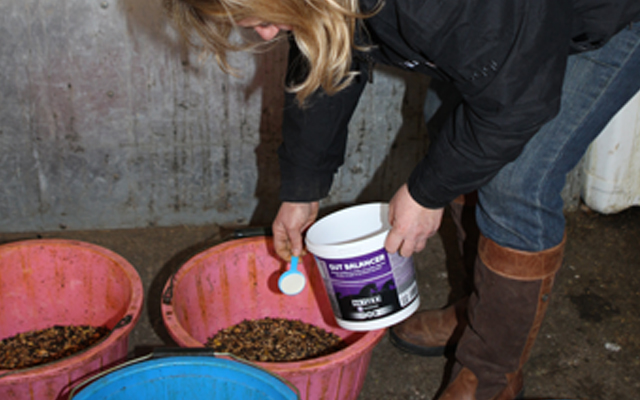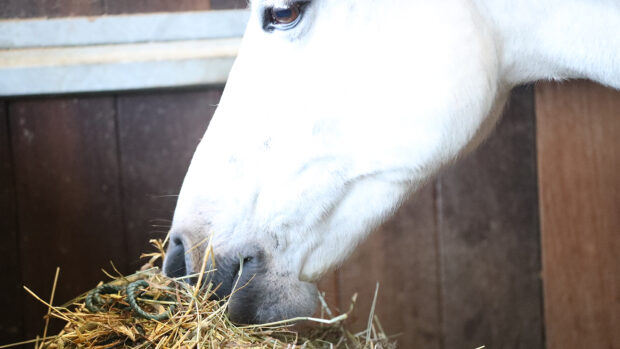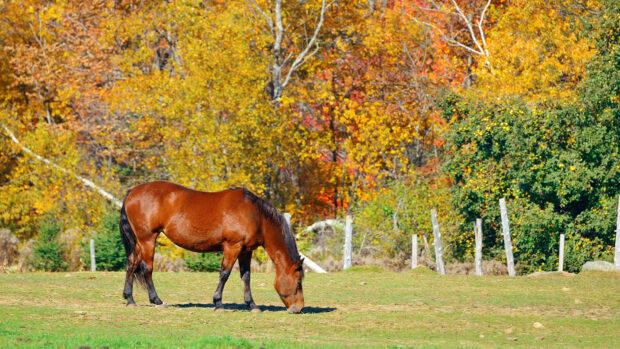Advertisement Feature
Experienced equine vet Becky Lees explains why autumn is such a high risk time for colic cases and how we can minimise the chances of digestive problems occurring.
Autumn diet changes – how do you reduce the risk of digestive upsets?
Autumn is a high risk time for digestive upsets. These may be mild and only seen as a change in consistency of your horse’s droppings or can be more serious, resulting in colic. Research has shown peaks in the incidence of colic in both autumn and spring due to changes in diet and management. However, most of us must change our horse’s routine at this time of year, so how can we reduce the risk of digestive upsets and colic occurring?
In the autumn many horses will start to spend more time stabled and this means their diet will change from predominantly grass to hay or haylage. Being inactive in a stable will also slow the horse’s gut down generating another risk factor for colic. Mild autumn weather can cause spurts of grass growth which can also unsettle horses’ tummies. So why are horses so sensitive to these changes?
Why is the horse’s digestive system so sensitive?
Horses are hind gut fermenters. This means that they break down the fibre in grass, hay and haylage in the caecum and colon, which make up the hind gut. A huge population of ‘friendly’ bacteria live in the horse’s hind gut, and their job is to ferment (break down) the fibre so that the nutrients are released and can be absorbed through the gut wall and into the blood. When a horse’s diet is changed these bugs have to adapt. Sudden dietary changes can upset the ‘good’ bugs and lead to an increase in the ‘bad’ bugs, which can lead to digestive upsets and colic.
So how can we help horse’s adapt to dietary changes?
Changes in diet and management should be made as gradually as possible to allow the ‘friendly’ bacteria in the hind gut time to adapt. Regular exercise and turnout will also help keep your horse’s gut settled. Make sure that your horse’s worming programme is up to date as this is another common cause of colic. Feeding a pre and probiotic supplement can help your horse adapt to dietary change to help keep even sensitive tummies settled.
What are pre and probiotics?
Probiotics are live ‘friendly’ bacteria that are given orally in a supplement. The most common equine probiotic is Saccharomyces Cerevisiae. Probiotics help boost the numbers of ‘friendly’ bacteria and re-balance the gut.
Prebiotics are substances that are an energy source for the ‘friendly’ bacteria to promote their numbers and growth. Typical equine prebiotics include Diamond V, mannan and fructo oligosaccharides, Brewer’s yeast and psyllium.
How to choose the best pre and probiotic supplement?
Firstly choose a supplement that contains the recognised equine probiotic Saccharomyces Cerevisiae to supply the ‘friendly’ bacteria. Then you need to make sure that the supplement contains a range of prebiotics as this is the food supply to help boost the ‘friendly’ bacteria to help balance the gut.
Look for a supplement that will also help maintain a healthy stomach with normal acid levels. Rice bran oil has been shown to be particularly effective at helping to maintain gastric health. Finally, a comprehensive range of vitamins, minerals and trace elements are essential to promote general health. Nettex Gut Balancer contains all of the above and is a unique supplement formulated to balance and enhance digestibility, promoting healthy gut function.
How is Nettex Gut Balancer unique?
Nettex Gut Balancer contains a unique blend of pre and probiotics plus other nutrients, helping horses adapt to changes in diet, which may help prevent colic. It is an advanced pre and probiotic supplement that uses the highest-grade ingredients including Saccharomyces Cerevisiae, Brewer’s yeast, psyllium, fructo oligosaccharides and mannan oligosaccharides, plus a unique ingredient, Diamond V, a concentrated natural yeast product shown to have a positive effect on nutrient digestibility*. Nettex Gut Balancer is also blended with an appropriate vitamin and mineral package, whey protein, rice bran oil and selected micro-nutrients to offer overall health and wellbeing.
In addition to this it will help maintain normal acid levels within the stomach. Acid levels can increase during stressful situations especially during competition, travelling or the everyday anxieties that occur. Nettex Gut Balancer will help to calm irritable horses and is ideal to be fed after periods of illness or medication to help restore the overall balance of your horse’s health.
To minimise the chances of digestive upsets this autumn, choose Nettex Gut Balancer to keep your horse’s gut balanced. #TrustNettex
*Source: Diamond V Mills trial data
Now you can join the Nettex Try It Club FREE and try Nettex products at half the price. If you like them, you can then buy from your local stockist with complete confidence!
Join the Nettex #TryIt Club today at www.nettexequine.com/tryit





